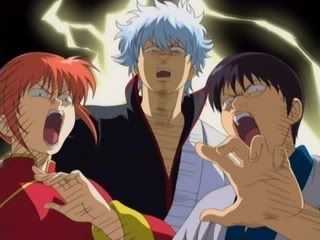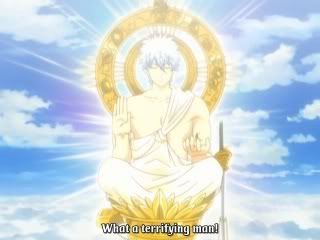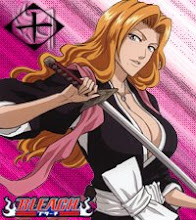Light: Boku ga... (I am...) L: Watashi wa... (I am...)
Both: Seigi da!! (Justice!!)
"Power tends to corrupt, and absolute power corrupts absolutely. Great men are almost always bad men." --John Emerich Edward Dalberg Acton, first Baron Acton (1834–1902)
Say one day you come across a notebook that contains the following instructions:
- The human whose name is written in this note shall die.
- This note will not take effect unless the writer has the person's face in their mind when writing his/her name. Therefore, people sharing the same name will not be affected.
- If the cause of death is written within 40 seconds of writing the person's name, it will happen.
- If the cause of death is not specified, the subject will simply die of a heart attack.
- After writing the cause of death, the details of the death should be written in the next 6 minutes and 40 seconds.
Would you snort "yeah, right" and pitch it in the nearest waste receptacle? Or would you test it out just for the helluvit? If your answer is "yes" to the second question, whose name would you write -- even if the possibility of that person actually dying might seem astronomical at best? And if s/he actually does die in the timeframe and manner you specified,
what would you do then?"
Death Note" is the story of a young man named Yagami Light confronted with this very dilemma. At the start of the story, he's a senior in high school with perfect grades, manners and metrosexual good looks. His dad is police chief, and while his family isn't rich, they have a nice house and live a relatively comfortable lifestyle. Since Light is so smart and does so well at school, his family has high expectations as to his future.
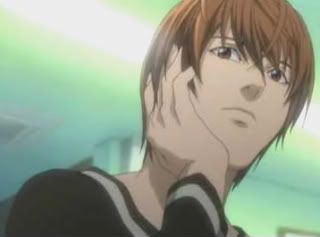 Yagami Light as we first meet him.
Yagami Light as we first meet him.Light suffers from ennui. He's bored, bored, bored. Kind of emo too. He sees evil and corruption all around him and heartily wishes that something could be done to fix it. While he's contemplating the wretched state of the world, a thin black book literally drops out of the sky and past the school window. This intrigues Light enough that he goes to find it, and DN would be one of the shortest mangas/animes in history if he'd trusted his bullshit meter after reading the instructions inside. Fortunately for the DN franchise that continues to rake in big bucks on DVDs, mangas, live-action movies, toys, etc., Light wanders disconsolately home with the notebook stuffed in his backpack.
Experimentation follows. Since Light wants the world to be a better place, he tests it out on people doing bad things and soon learns that the Note really works. Yeah, he's horrified to realize that he's just killed someone at first, but concludes almost immediately that he now wields the perfect tool to fix everything rotten in the world. Never mind he's now got a tag-along in the form of Ryuk, the shinigami (Death God) who dropped the Note in the human world to alleviate his own boredom. Turns out that because he's used the Note, Light can no longer go to Heaven or Hell, and Ryuk will write Light's name in his Note and take his remaining lifespan when he dies.
Does Light care about such petty details? Nah. As if the thought of a 17-year-old with godlike power over life and death isn't scary enough, Light goes all creepy and megalomaniacal on us, complete with evil laughter and glowing red eyes. Right off the bat, the "God of the New World" shows us his dark side, and from this point on his friendly, straight-A student demeanor is nothing more than a mask. Killing peeps who need killin' is now his bidness, and damn, bidness is
good.
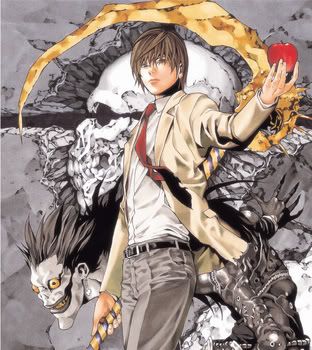 The God of the New World and his apple-eating shinigami buddy Ryuk.
The God of the New World and his apple-eating shinigami buddy Ryuk.So now Light spends his nights doing homework, studying for the Japanese equivalent of the SATs, and killing off criminals he sees on TV and in his dad's work files. Yup, Light's a hacker too, or maybe his dad just uses his wife's name as a password. Either way, bad guys are dropping like flies from heart attacks all over the place, even in jail. It's blatantly obvious
something's going on, and the media is taking notice. Light has become something of a folk hero known as "Kira" (Engrish for "killer", lol) and has fan sites on the Internet where people ask him to kill jerks who've wronged them. But guess what, law enforcement has taken an interest too, and the top criminal investigator in the world decides that Kira's murderous rampage must be stopped at all costs.
Enter L, my favorite DN character. He's so cool he only needs a letter for a name. Only a handful of people have actually met him face-to-face. They're not missing much, actually, as the guy's a total slouch with messy hair and baggy clothes who sits all balled up on a chair expressionlessly consuming sweets. Seriously, a diabetic could go into a coma just from seeing this guy make sugar-sludge coffee and wolfing down an endless parade of cakes, cookies and whatnot. L also bites & sucks his thumb, talks/thinks in a monotone, is fucking brilliant, and his financial resources put Bruce Wayne's to shame. In other words, he's a perfect foil to Prince Charming, Yagami Light.
 Kira's nemesis, the enigmatic & googly-eyed L.
Kira's nemesis, the enigmatic & googly-eyed L.After setting up Kira to kill a man on live TV, L does a voiceover and taunts that he's narrowed down the city where Kira lives and how Kira's revealed he can kill with nothing more than a face and name. He challenges Kira to kill him too, but of course, without knowing L's real name or what he looks like, Light can't do a damn thing except throw a major pissy fit (much to Ryuk's amusement). L mocks him some more, and they both simultaneously proclaim eventual victory, ending with, "I am Justice!!"
All this (and more I haven't covered) in just two episodes! The anime keeps an excellent pace through most of the series and managed to hold me in suspense even though I'd already read the manga and knew what was going to happen. Lighting and color supply dramatic effect, like when Light goes into red Kira mode and L in Kira-busting blue. A good deal of the dialogue is actually mental voice, for Light must scheme constantly to keep one step away from getting caught while trying to discern the real identities of his enemies and killing criminals at the same time, and L & other characters can't voice their suspicions or plans either. This kind of thing can easily get tiresome, but DN handles it so well that the thought dialogue adds quite a bit of tension. In DN, "as within" is definitely
not "as without". Lighthearted conversations belie a seething roil of treacherous thoughts and murderous intent.
I should probably say here that of the three DN versions -- manga, anime and live-action movies -- I vastly prefer the anime. I'm glad to say the anime follows the manga pretty closely (with the notable exception of the final scene). My kids like this show too and I bought the English-dubbed DVDs for their sake, but I'm not too fond of the voice acting for L. It's not terrible, but
the dude puts too much emotion into it and makes L sound kind of snide most of the time instead of the dispassionate monotone used in the original Japanese.
The movies? Ugh. I checked out the first one, and my curiosity as to how L would be portrayed was the only thing that helped me endure the suckage until his eventual appearance. The camera panned up, the dude spoke, and I promptly bailed forthwith. "Oh,
hell no," read the screenplay of my mind.
Yes, I know the DN movies are hugely popular in Japan and that the actors portraying Light and L are teenage heartthrobs. Me, I took one look at sneery, snotty movie-Light and thought, "No fucking way." Movie-L looked like he'd just crawled out of bed all squinty with a massive hangover. Maybe if I was a teenaged Japanese girl I'd have reacted differently, but this forty-something American mom only shook her head in disappointment. I had such high hopes, too. *sigh* The only good thing I can say is that movie-Ryuk and the effects associated with him were fucking awesome. The CGI was
flawless. I even showed my kids the part with the apple being eaten in midair because it was so freaking cool.
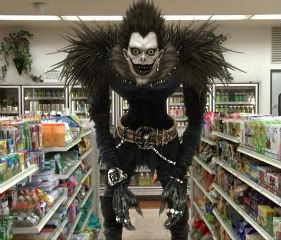 Point and laugh at the Billy Idol fanboi.
Point and laugh at the Billy Idol fanboi.Okay, enough about the dreadful movies. Moving on...
After L verbally bitchslaps Kira before a live broadcast audience, DN becomes an intense cat-and-mouse game between the two of them. Light's dad and a few other investigators from his department form a special task force with L to catch Kira. L picks Chief Yagami's son as his main suspect right away and initiates surveillance, and when that fails to unearth sufficient proof, he stalks Light at college and tells him right out that he's L. In the tradition of "keep your friends close but your enemies closer", the two end up working together on the task force -- Light ostensibly wanting to prove his innocence but actually trying to find out L's real name so he can kill him, and L waiting for Light to trip up and expose himself as Kira -- thereby providing the perfect material for tons of fan-made yaoi doujinshi. *snicker*
DN is a 37-episode anime, and it would spoil things to tell much more of the plot. That being said, some spoilers follow as I continue musing, so consider yourselves warned.
What really sells me on DN is the characterizations. The main characters are twisty and complex. It's impossible to hate Light even as he's turning into the biggest asshole on Earth. (I came pretty close when he finally killed L, however.) His road to hell was paved with good intentions, and up to the very end, he truly believed in the rightness of his vision. He's an antihero in every sense of the word. He considers himself good and wants to create a perfect world free of evil and corruption, yet his ego blinds him to the fact that killing people is murder. The God of the New World has very human failings, and it makes the viewer root for and against him at the same time. L, his successor Near, and the task force knowingly put their lives on the line in order to chase down Kira, and their courage is repeatedly demonstrated in the series (along with their respective worries, self-doubts and personality quirks). The only character I truly loathe is Misa-Misa, a fluff-headed chick with her own Death Note & accompanying shinigami. Light accepts her as his girlfriend to keep her under his control but considers her annoying & stupid too. All I can say is, if she was real and I had to put up with her for any length of time, I'd risk of having her write my name later by giving the silly bitch a serious smackdown. Sheesh.
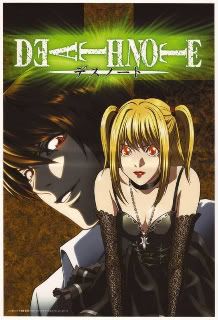 Amane Misa (with Light-as-Kira in the background). Irritatingly enough, she's still alive at the end of the series.
Amane Misa (with Light-as-Kira in the background). Irritatingly enough, she's still alive at the end of the series.Equally appealing (to me, at least) is that DN confronts its viewers with moral and ethical questions about murder, use and abuse of power, and personal definitions of justice. The line between right and wrong is decidedly blurred here. When cute little Matsuda embarrassedly points out that yeah, Kira's a murderer, but crime rates have dropped drastically all over the world, you totally sympathize with the cops' inner conflict about catching and stopping him. Just how far would
you be willing to go to create a peaceful world?
I'll wrap this post up by saying that DN is a classy, very well done anime with considerable visual & intellectual appeal. It's grimmer and more intense than your average anime, for while the comic relief may alleviate the viewer's tension, it tends to increase that of the characters involved. It's a bit like watching an animated version of "Silence of the Lambs" at times. If you're in the mood for something far removed from mecha or cutesy anime, "Death Note" might just be for you.
Now I shall tease you with the opening sequence of DN's first season!







